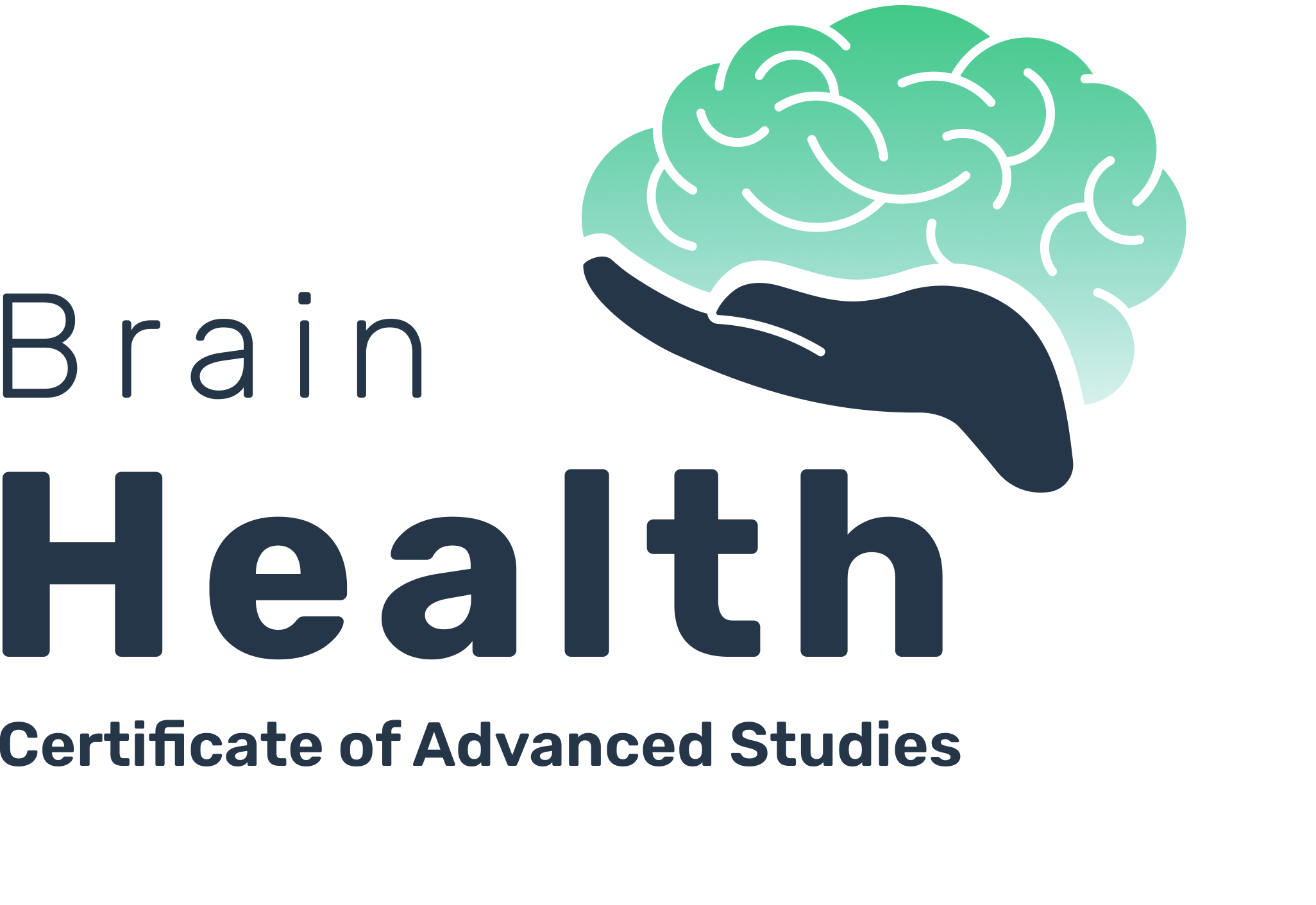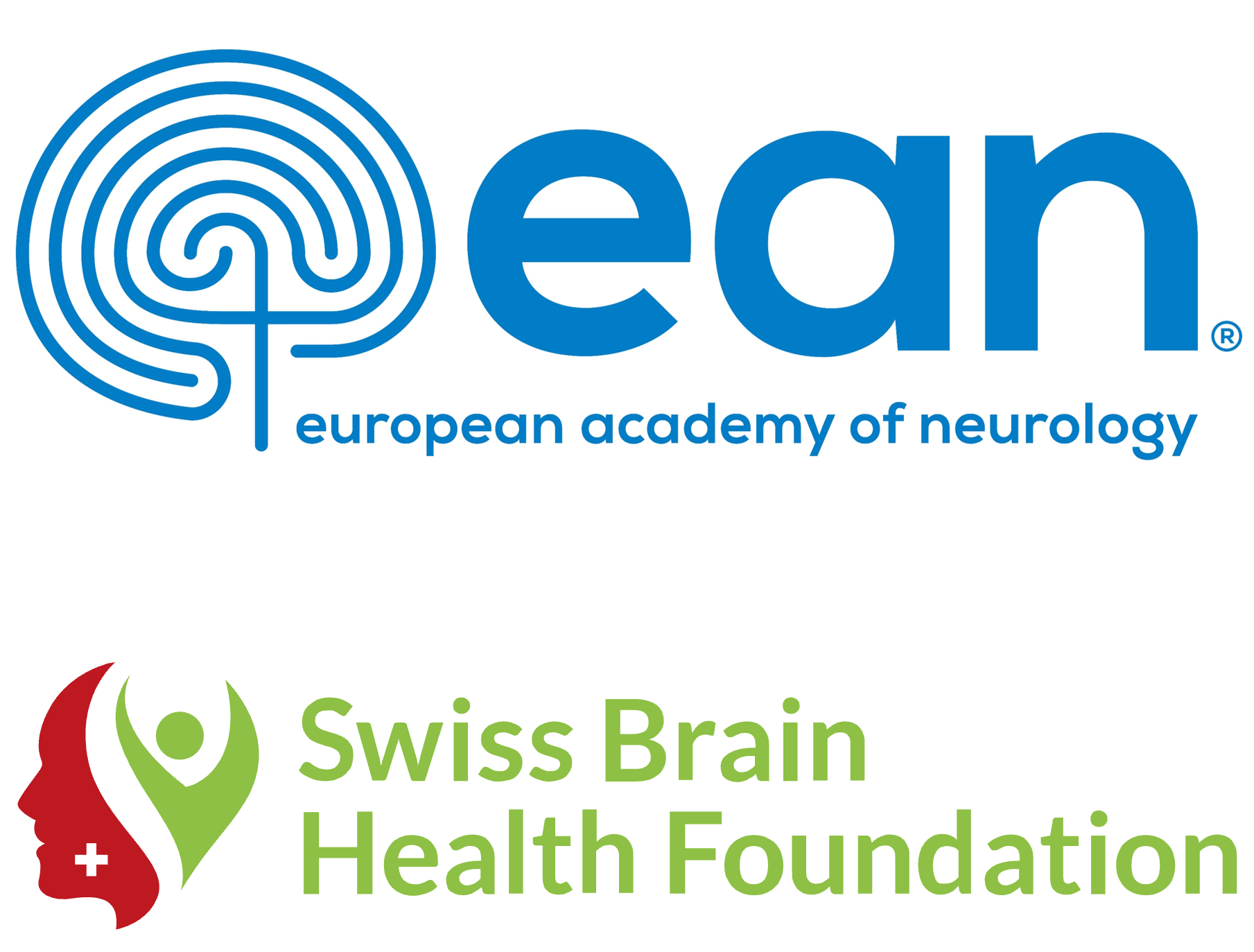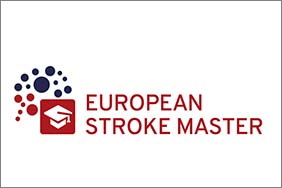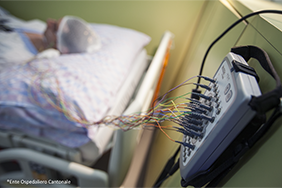CAS in Brain Health
Faculty of Medicine; Department of Neurology, Inselspital, University Hospital Bern

Online information event: 16 September 2026 6PM (CEST)
- Zoom: https://us06web.zoom.us/j/88451802898?pwd=WoHW2g1tbPoohtW2UgdR5tI4y0xIYa.1
- Meeting-ID: 884 5180 2898, Passcode: 714529
The CAS in Brain Health at the University of Bern, starting in January 2027, focuses on equipping professionals with advanced skills in promoting brain health.
Covering four modules – Introduction to Brain Health, Brain Disorders, Brain Health Risk/Protective Factors and Interventions, Brain Health Implementation – it aims to address neurological challenges through preventive strategies, enhancing expertise in healthcare sectors.
Apply by 31 October 2026!
| Degree | Certificate of Advanced Studies in Brain Health, University of Bern (CAS BH Unibe) |
|---|---|
| Start | 01/2027 |
| Length | January 2027 - December 2027 |
| Scope | 15 ECTS (~375-450 working hours) |
| Cycle | Annually |
| Flexible entry possible | No |
| Single module visitable | No |
| Place | Online |
| Language | English |
| Admission | A (university) degree and professional experience in the healthcare sector (clinical or non-clinical) are prerequisites for admission to the study program. |
| Registration until | 2026/10/31 |
| Cost | CHF 6'000 (scholarships available) |
| Special Offer | Scholarships available |
| Organising institutions | Faculty of Medicine; Department of Neurology, Inselspital, University Hospital Bern |
| Partner | EAN | SBHF |

|
About the programme
Scope and structure
The CAS programme comprises a total of at least 15 ECTS credits. It is made up of four modules, each worth 3-5 ECTS credits.
The programme covers the following topics:
- Introduction to Brain Health
- Brain Disorders
- Risk Factors, Protective Factors and Interventions
- Brain Health Implementation.
Goals of the course
The participants
- understand the determinants of brain health, including physical, psychological and social factors, and can analyse their effects on brain function
- develop a sound knowledge of various brain diseases and disorders in order to understand and apply diagnostic, preventive and treatment strategies
- learn intervention techniques and strategies to promote brain health and can apply these to support patients' cognitive abilities and well-being
- develop individualised action plans for improving brain health based on the knowledge and skills learnt to bring about sustainable changes in quality of life.
Didactic principals
The programme uses various teaching methods to optimally support the transfer of learning and knowledge and to ensure a lively learning culture.
In addition to imparting theory- and practice-orientated knowledge and skills, the courses offer space for reflection and discussion. The content and form of the events take into account the needs and wishes of the participants. Their specialist knowledge and experience as professionals are incorporated into the teaching and learning process.
Language
All courses, exams, and course materials are in English.
Modules
The CAS Brain Health is structured modularly. It is comprised of 4 modules:
-
Module 1 – Introduction to Brain Health
| Lecture | speaker (country) | prerecorded / live online |
|---|---|---|
| Start Event | David Tanner, Prof. Simon Jung | live online: 12 January 2026 5PM |
| What is Brain Helath? | Prof. Claudio Bassetti (Switzerland) | live online: 19 January 2026 5PM |
| Brain evolution from an anthropological perspective | Prof. Alain Froment (France) | prerecorded |
| Brain anatomy | Dr. med Michael Oberholzer (Switzerland) | prerecorded |
| Sleep and wakefulness | PD Dr. med. Markus Schmidt (Switzerland) | prerecorded |
| Learning and memory | Prof. Iris Penner (Switzerland) | prerecorded |
| Emotional system | Prof. Chantal Martin Sölch (Switzerland) | prerecorded |
| Executive Functions: Decision-Making and Problem-Solving | tbd | prerecorded |
| Attention and Cognitive Control | tbd | prerecorded |
| Autonomic System | tbd | prerecorded |
| Brain-Heart interactions | Prof. Jan Scheitz (Germany) | prerecorded |
| Brain-Muscle interactions | tbd | prerecorded |
| Brain-Gut interactions | Prof. Bruno Bonaz (France) | prerecorded |
| Brain-Hormone interactions | Prof. Petra Stute (Switzerland) | prerecorded |
| Sex and gender differences in neurological and psychiatric illnesses | Women's Brain Foundation | live online: 28 January 2026 5PM |
| Sensory processing sensitivity | Prof. Corina Greven (Netherlands) | prerecorded |
| Neuroplasticity - use it or lose it | Prof. Adrian Guggisberg (Switzerland) | prerecorded |
| The aging brain: Plasticity and Cognitive Reserve | Prof. Yaakov Stern (United States) | prerecorded |
| Immunosenescence | PD Dr. med Robert Hoepner (Switzerland) | prerecorded |
| Genetic epidemiology | Prof. Zoltan Kutalik (Switzerland) | prerecorded |
| What is environment? | Prof. Jacques Reis (France) | live online: 02 February 2026 5PM |
| Developmental origin of health and disease (DOHaD) | Prof. Michael Ross (United States) | live online: 09 February 2026 5PM |
| Exposome | Prof. Robert Barouki (France) | live online: 19 February 2026 5PM |
| One Health | Prof. Jakob Zinsstag (Switzerland) | prerecorded |
-
Module 2 – Brain Disorders
- Traumatic brain injury (TBI)
- Chronic traumatic encephalopathy (CTE)
- Stroke
- Neurodegenerative disorders
- Epilepsy
- Gait disorders & falling
- Parkinson's disease
- Autoimmune disorders
- Neuropediatric disorders
- Sleep disorders
- Headache Disorders
- Functional Neuronal Diseases (FND)
- Developmental disorders
- Depression
- Myalgic encephalomyelitis / Chronic fatique syndrome
- Bipolar disorders
- Adjustment disorders
- Posttraumatic stress disorder
- Substance abuse
- Obesity and eating disorders
- ADHD / ADD in children and adolescents
- Obsessive Compulsive Disorder (OCD) + Anxiety
- Autism Spectrum disorder (ASD) and ADHD
- Borderline Personality Disorder (BPD) & other personality disorders
- Schizophrenia and other psychotic disorders
-
Module 3 – Risk Factors, Protective Factors and Interventions
- Preserving prenatal health & healthy birth
- Preserving child health
- Preserving mental child health
- Education & Cognitive Reserve
- Resilience and emotional regulation
- Clarity & Fortitude
- Humor
- Preserving mental activity
- Social Connectedness and Cognitive Longevity
- Sexual health
- Sleep Health
- Stress Management
- Healthy use of digital media
- Healthy use of artifical intelligence
- Physical activity & physical health
- Physical activity & mental health
- Healthy diet
- Nutritional supplements
- Smoking cessation
- Prevention & treatment of infections
- Prevention of environmental neurotoxicity
- Air pollution
- Water pollution
- Noise pollution
- Light
- Electromagnetic pollution & radiation
- Climate change & neurological disorders
- Climate change & psychiatric disorders
- Neuroprotection Strategies
- Pharmacological cognitive enhancers
- Brain-Computer Interfaces: Applications
- Neurostimulation
- Promises of brain technology
- Music and art therapy for mental health
- Wearable Technology for Brain Health
- Neurorehabiliation
-
Module 4 – Brain Health Implementation
- Assessment of brain health
- Health impact assessment
- Implementation of Brain Health Programm
- Implementation of Mental Health Programm
- Nurses contribution to Brain Health
- Patient-Centered Approaches in Brain Health Interventions
- Health communication theories and models
- Argumentation, rhetoric and persuasion
- How to Change Habits for Healthy Lifestyle (Prof. Dr. Tobias Esch)
- Strategies for healthy birth & childhood
- Strategies for health education
- Strategies for social health
- Strategies for work health
- Strategies for healthy lifestyle
- Strategies for early detection of psychiatric disorders
- Strategies for suicid prevention
- Vaccination strategies
- Strategies for avoidance of substance abuse
- Green & blue cities
- The impact of different health care philosophies and cultures
- Strategies to influence policymakers
- Brain capital and brain economy
- Brain health for skill-based transitions
- Investing Strategies
- Self responsibility - opportunity and risk
- Ethics and responsible innervation
- Future Directions in Brain Health
Subject to alterations.
Organising institution and faculty
The CAS in Brain Health is operated by the University of Bern and the Department of Neurology, Inselspital, University Hospital Bern.
Organising committee
• Simon Jung (Programme Director, Neurology)
• David Tanner (Director of Studies)
• Franka Theile (Programme Administrator)
International Faculty
• Emiliano Albanese, Switzerland
• Astri Arnesen, Norway, President EFNA
• Claudio Bassetti, Past President EAN, Chair of International Faculty, Switzerland
• Thomas Berger, Austria
• Indrit Bègue, Switzerland
• Paul Boon, President EAN, Belgium
• Suzanne Dickson, President EBC, Sweden
• Geert Dom, President EPA, Belgium
• Raphael Guzman, President SSNC, Switzerland
• Peter Falkai, Past-President EPA, Germany
• Andrea Fiorillo, President SIPS, Italy
• Antoine Flahault, President SSPH+, Switzerland
• Giovanni Frisoni, Switzerland
• Wolfgang Grisold, President WFN, Austria
• Annette Hackenberg, President SSNP, Switzerland
• Albert Hofmann, USA
• Peter Kelly, Ireland, President ESO
• Matilde Leonardi, Italy
• Karl-Olof Loevblad, Past-President SSNR, Switzerland
• Anita Lüthy, Past-President SSN, Switzerland
• Marco Medina, Past-President PAFNS, Honduras
• Elena Moro, President-elect EAN, France
• Mayowa Owolabi, Nigeria
• Irena Rektorova, Czech Republic
• Jacques Reis, Co-Chair WFN-ENSG, France
• Hakan Sarikaya, Switzerland
• Peter S. Spencer, Chair WFN-ENSG, Oregon Health & Science University, USA
• Barbara Tettenborn, Switzerland
• Susanne Wegener, Switzerland
• Corina Wirth, President Public Health Switzerland, Switzerland
• Thomas Zeltner, Past-President BAG, Switzerland
• Tobias Esch, University Witten/Herdecke
Local Faculty
• Simon Jung (Programme Director, Neurology)
• David Tanner (Director of Studies)
• Kristina Adorjan (Psychiatry)
• Marcel Arnold (Neurology)
• Lia Bally (Endocrinology)
• Tatiana Brémovà Ertl (Neurology)
• Bogdan Draganski (Neurology)
• Tanja Belser (Neurology)
• Annika Frahsa (Social and Preventive Medicine)
• Urs Fischer (Neurology)
• Mirjam Heldner (Neurology)
• Michael Kaess (Child and Adolescent Psychiatry)
• Andrea Klein (Neuropediatrics)
• Stefan Klöppel (Geriatric Psychiatry)
• Claudio Nigg (Sport Science)
• Iris Penner (Neuropsychology)
• Julia Schmid (Sport Science)
• Adrian Vatter (Political Science)
• Anna Maria Vicedo Cabrera (Social and Preventive Medicine)
• Claudia Weiss (Swiss Association of Nursing Science)
• Roland Wiest (Neuroradiology)
• Matthias Wilhelm (Rehabilitation and Sports Medicine)
Admission
Prerequisites for admission to the Certificate programme are
- a (university) degree and
- professional experience in the healthcare sector
Target group:
- Doctors with or without specialisation
- General practitioners
- Psychologists and neuropsychologists
- Sport scientists
- Nurses
- Physical, occupational and speech therapists
- Health care providers
- Public Health Specialists
- Engineers
Exceptions regarding admission requirements may be approved by the programme director «sur dossier».
Permission to participate in the course is decided by the programme administration upon application by the course management. There is no automatic entitlement to admission.
Application and tuition fees
Application deadline
The application deadline is October 31st, 2025. The official application deadline has passed. However, the form is still open, and applications are still possible. Please register as soon as possible if you wish to start with us in 2026.
Tuition fees
The fees are CHF 6'000. Scholarships are available.
Scholarships
Personal sponsor:
We encourage you to find your personal sponsor for your tuition fee. Your employer might take over some of the costs.
EAN scholarships:
The European Academy of Neurology offers different scholarship types for participants:
- who are residents from EAN member countries and corresponding member countries
- who come from low, lower-middle or upper-middle income countries*: 3 partial scholarships (4.000 CHF)
- who come from high-income countries*: 3 partial scholarship (2.000 CHF)
* as defined by the World Bank
To be considered for an EAN scholarship, please read the EAN scholarship information for CAS in Brain Health programme.
Partners and Sponsors
Sponsors and Partners
We gratefully acknowledge the support of our partners and sponsors, whose contributions make this work possible.
- European Academy of Neurology (EAN)
- Swiss Neurological Society (SNS)
- University Psychiatric Services Bern (UPD)
- Swiss Brain Health Foundation (SBHF)
- Swiss Federation of Clinical Neuro-Societies (SFCNS)
- Angelini Pharma
All content is developed independently; financial support from sponsors does not influence editorial decisions or scientific content.
Documents
Contact

- Name / Titel
- Franka Theile, Dipl. Natw. ETH
- Funktion
- Study Programme Administration
- info@brainhealth.ch

- Name / Titel
- David Tanner, Msc ETH
- Funktion
- Director of Studies
- info@brainhealth.ch

- Name / Titel
- Prof. Dr. med. Simon Jung
- Funktion
- Programme Director
- simon.jung@insel.ch

- Name / Titel
- Prof. Dr. Claudio Bassetti
- Funktion
- Dean
- claudio.bassetti@unibe.ch
- Phone
- +41 31 684 00 60
Associate Courses
MAS in Stroke Medicine
| Degree | MAS |
|---|---|
| Start | 02/2028 |
| Language | Englisch |
| Cost | CHF 20’000 |
The programme aims to train the next generation of clinicians and researchers in stroke care throughout Europe. An international faculty of world leading stroke experts will provide lectures, seminars and workshops in close collaboration with the local faculty. The programme offers an efficient mix of different learning methods, both in person and remote.
MAS in Sleep Medicine
| Degree | MAS |
|---|---|
| Start | 03/2027 |
| Language | Englisch |
| Cost | CHF 20’000 |
The Academy of Sleep and Consciousness ASC offers unique postgraduate education which provides advanced medical and scientific insights into sleep medicine. An international team of specialist lecturers ensure that course subject matter is on the latest scientific knowledge. The course imparts specialized knowledge and transferable skills through a variety of efficient learning methods and platforms, such as online modules (incl. advanced Sleep Scoring) and a hands-on module.


